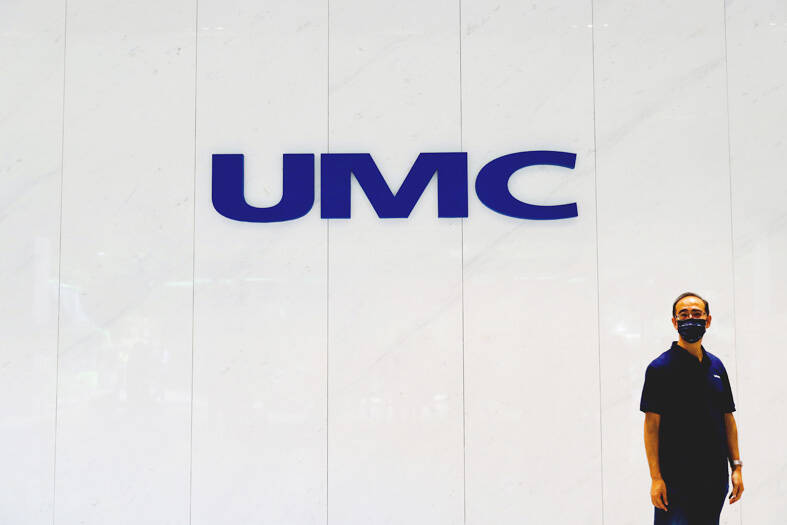United Microelectronics Corp (UMC, 聯電) yesterday said it has signed a long-term agreement with Infineon Technologies AG to increase its 40-nanometer capacity for the production of Infineon’s automotive microcontrollers.
Infineon’s high-performance microcontroller products, based on the company’s embedded non-volatile memories technology, would be produced at UMC’s 12-inch fab in Singapore, the companies said in a joint statement.
Infineon said this year it is increasing the amount of automotive microcontrollers it sells to almost 1 million per day to cope with an increase in demand for microcontrollers, which are used in a wide range of functions in vehicles.

Photo: Ritchie B. Tongo, EPA-EFE
“With this strategic cooperation agreement, we have secured additional long-term capacity to serve Infineon’s customers in the fast-growing automotive market,” Infineon chief operating officer Rutger Wijburg said in the statement. “Going forward, Infineon and UMC will further deepen automotive collaboration in the areas of microcontroller, power management and connectivity solutions.”
The multi-year supply agreement further reinforces UMC’s long-standing partnership with Infineon across various automotive, artificial intelligence of things and 5G market segments, UMC copresident Jason Wang (王石) said in the statement.
Since 2019, UMC has tripled its shipments of automotive products, Wang said.
The chipmaker said it expects that momentum to continue as demand for automotive semiconductors rises.
“Given our specialty technology leadership, diversified manufacturing footprint, and focus on quality and operational excellence, we look forward to deepening our collaborations with world-class automotive leaders such as Infineon,” Wang said.
Automotive chips made up about 9 percent of UMC’s overall revenue of NT$278.71 billion (US$9.11 billion) last year, the company told investors in January.
It said its revenue from automotive chips grew 82 percent annually last year, and attributed the increase to the growing trend of vehicle electrification and automation.
With demand for chips used in computers and mobile phones weakening, automotive chips have become an important driving force for UMC, the company said.

Quanta Computer Inc (廣達) chairman Barry Lam (林百里) is expected to share his views about the artificial intelligence (AI) industry’s prospects during his speech at the company’s 37th anniversary ceremony, as AI servers have become a new growth engine for the equipment manufacturing service provider. Lam’s speech is much anticipated, as Quanta has risen as one of the world’s major AI server suppliers. The company reported a 30 percent year-on-year growth in consolidated revenue to NT$1.41 trillion (US$43.35 billion) last year, thanks to fast-growing demand for servers, especially those with AI capabilities. The company told investors in November last year that

United Microelectronics Corp (UMC, 聯電) forecast that its wafer shipments this quarter would grow up to 7 percent sequentially and the factory utilization rate would rise to 75 percent, indicating that customers did not alter their ordering behavior due to the US President Donald Trump’s capricious US tariff policies. However, the uncertainty about US tariffs has weighed on the chipmaker’s business visibility for the second half of this year, UMC chief financial officer Liu Chi-tung (劉啟東) said at an online earnings conference yesterday. “Although the escalating trade tensions and global tariff policies have increased uncertainty in the semiconductor industry, we have not

Intel Corp has named Tasha Chuang (莊蓓瑜) to lead Intel Taiwan in a bid to reinforce relations between the company and its Taiwanese partners. The appointment of Chuang as general manager for Intel Taiwan takes effect on Thursday, the firm said in a statement yesterday. Chuang is to lead her team in Taiwan to pursue product development and sales growth in an effort to reinforce the company’s ties with its partners and clients, Intel said. Chuang was previously in charge of managing Intel’s ties with leading Taiwanese PC brand Asustek Computer Inc (華碩), which included helping Asustek strengthen its global businesses, the company

Power supply and electronic components maker Delta Electronics Inc (台達電) yesterday said it plans to ship its new 1 megawatt charging systems for electric trucks and buses in the first half of next year at the earliest. The new charging piles, which deliver up to 1 megawatt of charging power, are designed for heavy-duty electric vehicles, and support a maximum current of 1,500 amperes and output of 1,250 volts, Delta said in a news release. “If everything goes smoothly, we could begin shipping those new charging systems as early as in the first half of next year,” a company official said. The new